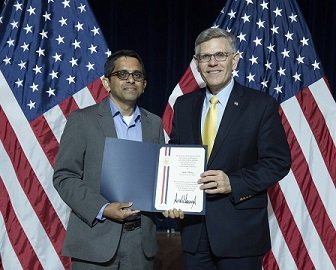When NIH/Lasker Clinical Research Scholar Anish Thomas first started in medicine, his work was almost entirely focused on patient care. As an attending physician in Bangalore, India, he saw more than 60 patients on an average day. He realized that while he wanted to continue to see patients, “it would be more interesting to see if we can figure out new ways to treat them,” Thomas says.

Anish Thomas receiving his PECASE award from Kelvin Droegemeier, Director of The White House Office of Science and Technology Policy, in Washington DC on July 25
Today, Thomas is a medical oncologist at the NIH National Cancer Institute, working to develop more effective therapies for patients with small-cell lung cancer (SCLC). His research is already being recognized within the medical research community; this summer, Thomas was a recipient of the Presidential Early Career Award for Scientists and Engineers (PECASE), the highest honor bestowed by the US government on early-career researchers who show exceptional potential for leadership in science and technology. For Thomas, receiving the PECASE award serves as an even greater motivation to continue his work developing novel treatments and shepherding them from the lab to the clinic.
Thomas chose to focus on SCLC because he saw a clear need. Ten to 15 percent of all lung cancers are SCLC, and on average, just 6.3 percent of patients survive five years after diagnosis. While SCLC is often initially responsive to chemotherapy, relapse is common. “These tumors cells have a very unstable genome and epigenome that is constantly evolving in response to treatment,” Thomas says. Standard treatments for SCLC are essentially the same as they were 30 years ago, he adds.
Thomas first had the idea of launching a clinical program for small cell lung cancer in 2014. He hypothesized that by pairing chemotherapy with drugs that inhibit the repair of damaged DNA in tumor cells, he could develop treatment regimens that both shrink tumors and delay recurrence.
Thomas launched his first SCLC trial in 2015. His first study is now entering a randomized phase 2 trial treating patients with the novel combination and comparing it to the existing standard treatment.
Building out his research program has not been without challenges, but Thomas notes that working with trial participants keeps him inspired. “Patients have been able to celebrate their 70th birthday or attend a daughter’s graduation or wedding because their life was extended by a few more months due to treatment,” he says. Even if a treatment does not work for a patient, “I think the fact that we can offer some hope is meaningful.”
by Lucy Hicks
